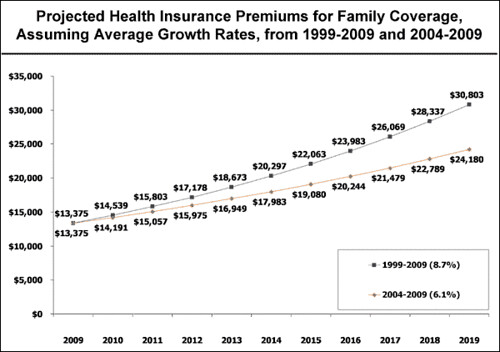Enjoy Your $30,000 Insurance Policy
The Henry J. Kaiser Family Foundation released a simple document that could transform the entire health care debate in the United States. Absolutely no other set of statistics so cleanly identify the nature of our broken system.
This week we put out our annual benchmark survey of employer health coverage and costs. Two numbers jumped off the pages.
The first number was the average cost of a family health insurance policy in 2009: $13,375. To put that number in context, if you are an employer, you can hire an employee at the minimum wage for about $15,000 per year. If you are a consumer, you can rent an average two-bedroom apartment nationwide for $11,136 per year (though it is quite a bit more here in Menlo Park, California where our Foundation is based). You can also buy a new Chevy Aveo for $12,000, and it gets 35 miles per gallon on the highway.
The other result that jumped off the page was the stark contrast between increases in health insurance premiums and overall inflation in the general economy. Premiums went up 5% and prices overall fell 0.7% (mainly driven by a big drop-off in energy prices) [...] over the last ten years premiums have increased by 131%, while wages have grown 38% and inflation has grown 28%. Consider this: If people (and businesses) are as concerned as they are now about rising health care costs in a period when they are actually moderating, how much more concerned will they be when rates of increase return to historic averages?
Let's do some very simple arithmetic. Start with a fairly conservative assumption: If we assume that premium increases over the next ten years will average what they did over the last five (about 6.1% per year), the average premium for a family policy in 2019 will be $24,180. That's a big number. On the other hand, if we assume increases revert to the average of the last ten years—an average annual increase of about 8.7% and a very plausible scenario—premiums in 2019 will average a whopping $30,803, a very scary number.
And here's the chart:

Very few families will be able to afford a $30,000 insurance policy. Even fewer companies will find a market for it. So their only choice will be to cut back on what the coverage offers, either with less benefits or lower amounts of coverage. More businesses will have to drop their coverage and throw their employees on to the individual market, driving costs up higher, as individuals aren't bargaining collectively with insurers for lower prices.
Simply put, the private insurance market would cease to exist within 10 years, maybe a little more, on the current trajectory.
Those who think "failure is not an option" is just a slogan should really take a look at the Kaiser Foundation numbers. What they show is nothing but a nightmare.
Even the President quickly took notice of the report in his speech to the AFL-CIO today:
In fact, a new report from the Kaiser Family Foundation was released today showing that family premiums rose more than 130 percent over the last 10 years -- three times faster than wages. They now average over $13,000 a year, the highest amount on record, which is why when you go in to negotiate, you can't even think about negotiating for a salary -- a wage increase because the whole negotiation is about trying to keep the benefits you already have. (Applause.)
That's not just the fault of the employer, it's the fault of a broken health care system that's sucking up all the money. When are we going to stop it? (Applause.) When are we going to say enough is enough? How many more workers have to lose their coverage? How many more families have to go into the red for a sick loved one? (Applause.) How much longer are we going to have to wait? It can't wait. (Applause.)
AUDIENCE: We can't wait! We can't wait! We can't wait!
It's not an idle threat to tell everyone that they will not have health insurance in ten years without reform. Heck, that's why the insurance industry, while fighting anything that drains their profits, ostensibly supports reform. If the insurance market goes down the gutter, so do they. The opportunity exists for us to remake our health care system to remove the excess, the money that never goes toward care, the bloated salaries. Otherwise, even with a reformed system we could end up with the same people running the same system right into the ground.
Labels: Barack Obama, health care, insurance industry






<< Home